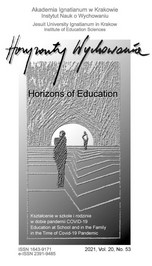Towarzyszenie wychowawcze w formacji człowieka
Accompanying pedagogy in human formation
Author(s): Zbigniew Marek, Anna WalulikSubject(s): Ethics / Practical Philosophy, Social development, Pedagogy
Published by: Uniwersytet Ignatianum w Krakowie
Keywords: formation; accompanying; education; maturity; ignatian tradition;
Summary/Abstract: Research objective: The aim of the paper is to demonstrate how a specific form of education – accompanying education that has its source in the Ignatian tradition – fosters the formation of the pupil. Formation is understood here as the educational endeavor directed at the development of all human skills and talents, and the whole person: body and spirit, intellect, will, feelings. The description of the formation processes will focus on the moral formation, because morality is the fullest expression of the value of educational processes. THE RESEARCH PROBLEM AND METHODS: The paper looks for the answer to the question regarding the possibility of employing accompanying pedagogy in human formation developed from the perspective of the Ignatian tradition. The characteristic features of the Ignatian tradition described in the subject literature are applied to the requirements of the processes of moral formation. THE PROCESS OF ARGUMENTATION: The interpretation of the Ignatian tradition and the spirituality developed on its bases allow for developing a model of moral formation. RESEARCH RESULTS: The processes of moral formation require the involvement of the forms of cognition available to man (natural and supernatural). Cognition gives a person the ability to “process” and expand his knowledge of the man-made reality. This ability consists what is objectively good and what is bad and in choosing good as a consequence of this recognition. CONCLUSIONS, INNOVATIONS, AND RECOMMENDATIONS: Moral formation is the actual reality that takes place in the life of every person. People’s functioning in everyday life is the visible outcome of this formation, which requires from pedagogy particular forms of social coexistence. One of these is accompanying pedagogy, which, while respecting the pupil’s freedom, places another person next to him – that of an educator/mentor acting as a kind of a witness to the history of his life.
Journal: Horyzonty Wychowania
- Issue Year: 19/2020
- Issue No: 50
- Page Range: 105-116
- Page Count: 12
- Language: Polish

